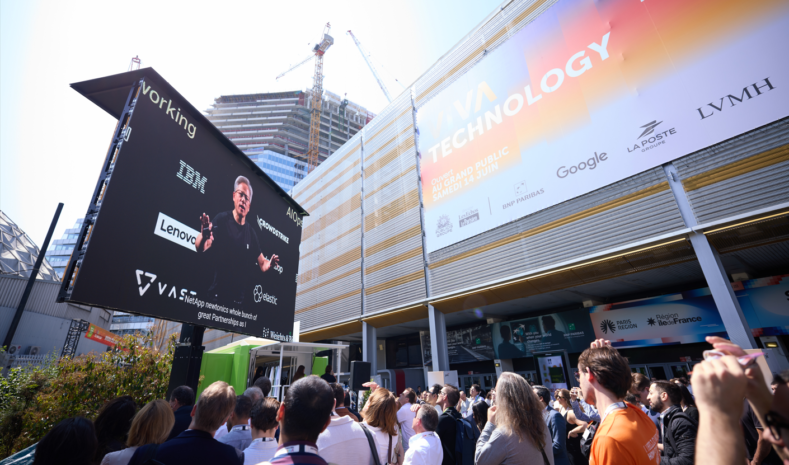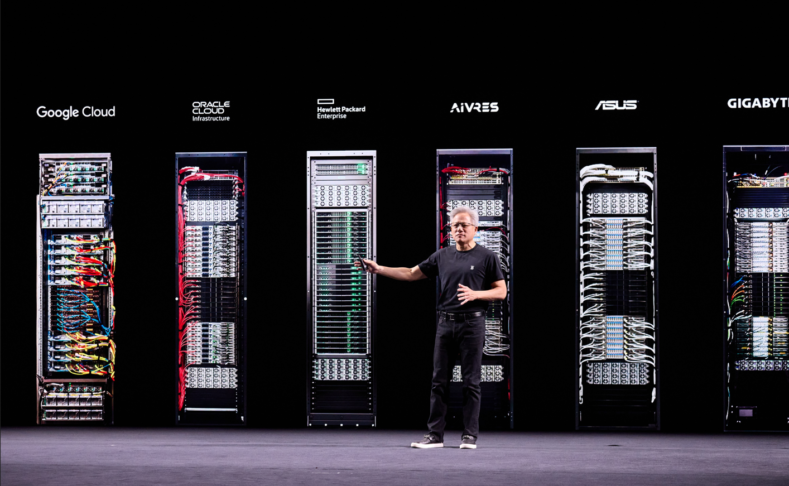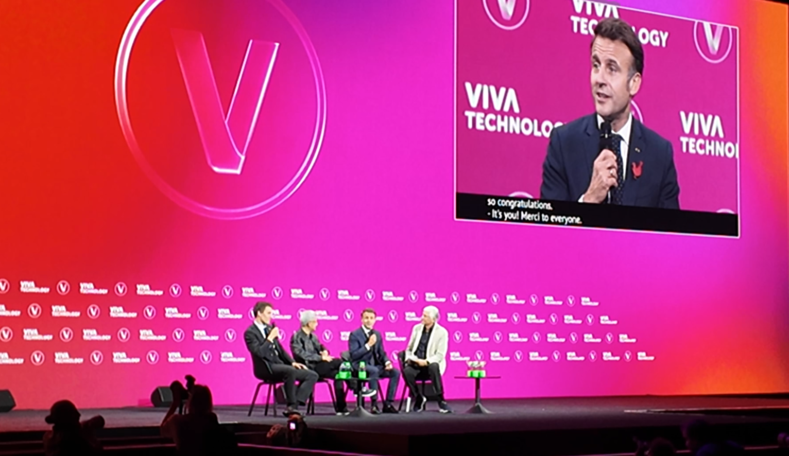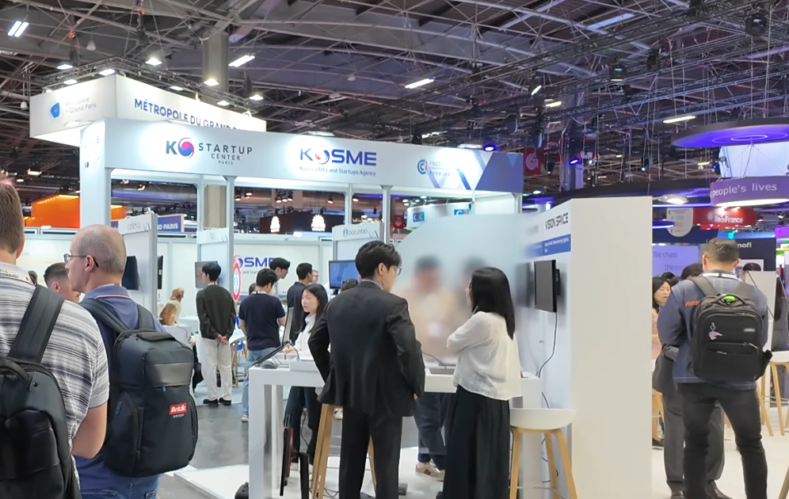On the first day of VivaTechnology 2025, held at the Paris Expo Porte de Versailles, the venue was filled with excitement. With over 165,000 participants, artificial intelligence (AI) emerged as a key topic of the event. In particular, NVIDIA’s innovative announcement and the industry’s keen interest heralded the beginning of the AI era. Active international participation, including the participation of the Korean K-Startup delegation and Canada, which was selected as a partner country this year, once again proved that Paris is the center of global technological innovation.

< The hot atmosphere of VivaTech 2025, provided by Viva Technology 2025 >
AI Tsunami: NVIDIA’s Blueprint for an Intelligent Future and Europe’s Strategic Shift
Jensen Huang's Vision Presented: 'AI Factory' and the New Industrial Revolution
In his keynote speech, NVIDIA founder and CEO Jensen Huang emphasized that AI is evolving from 'Perception AI', 'Generative AI', and now into the wave of 'Agent AI', and that robotics will be its physical embodiment.

< CEO Jensen Huang, VivaTech 2025 Keynote Speech, provided by Viva Technology 2025 >
Jensen Huang emphasized that data centers are evolving from passive data storage to actively producing intelligence, “token factories,” which will become a social infrastructure as essential as electricity. Blackwell added that it is a marvel of engineering and that we are just getting started.
The engine of this AI factory was introduced with NVIDIA's latest GPU platform, Grace Blackwell, and NVIDIA DGX Cloud Lepton, which efficiently manages large-scale language models (LLMs) optimized for specific tasks. Jensen Huang's concept presentation redefines the role of infrastructure and AI, and heralds the beginning of AI dominance on the first day of VivaTech.
NVIDIA’s European Invasion: Powering the Continent’s AI Ambitions
NVIDIA announced plans to build a cutting-edge AI infrastructure across Europe in partnership with major European telecommunications companies, including Orange, Telefónica, Telenor, Swisscom, and Fastweb. Jensen Huang said, “Europe has now realized the importance of building AI infrastructure.” In particular, the plan to build a dedicated AI cloud in Europe through a partnership with Mistral AI, a leader in generative AI in France, is the core of this announcement. In addition, plans were revealed to build the world’s first industrial AI cloud in Europe, focusing on digital twins and simulations. Jensen Huang predicted, “Everything physical will be built virtually first.”
These announcements clearly demonstrate NVIDIA’s strategic commitment to Europe and the key role NVIDIA plays in building the continent’s AI ecosystem. The partnership between NVIDIA and Mistral AI goes beyond simple business cooperation and carries geopolitical implications. Europe, especially France, has been emphasizing “digital sovereignty” and has been moving to reduce its dependence on American and Chinese tech giants. Mistral AI is considered the European version of OpenAI, and the fact that French President Emmanuel Macron himself came forward and said, “This is a game changer,” suggests that this collaboration is not just a commercial deal but has national strategic importance.

< VivaTech 2025, (from left) Arthur Mensch, CEO of Mistral AI, Jensen Huang, CEO of NVIDIA, Emmanuel Macron, President of France, and Maurice Lévy, Chairman of Publicis Groupe, are having a heated discussion on the topic of 'National AI Autonomy and International Cooperation'>
Jensen Huang’s emphasis on “national AI autonomy” is perfectly in line with these European ambitions, and Nvidia is a key partner in achieving this goal. This suggests a new transatlantic technology cooperation model in which US companies support the construction of localized “sovereignty-friendly” infrastructure in allies, and suggests the possibility of forming a technology bloc to counter other technological powers.
The Justification for Sovereignty: Europe’s Quest for AI Autonomy
French President Emmanuel Macron expressed his support for the NVIDIA-Mistral AI collaboration, calling it a “game changer” for securing European AI sovereignty. Jensen Huang also emphasized the importance of national AI autonomy, saying, “You can outsource a lot, but it doesn’t make sense to outsource all of the intelligence.” This is in line with VivaTech’s core geopolitical theme, reflecting Europe’s desire to control its digital destiny.
If Jensen Huang's vision of AI data centers as 'token factories' and key national infrastructure becomes a reality, global competition over 'AI production capabilities' will begin in earnest. Each country recognizes control of essential infrastructure as the foundation of economic stability and security, and the ability to 'produce intelligence locally' mentioned by Huang will become a key differentiating factor for national competitiveness and security.
Europe’s plan to expand its AI computing capacity tenfold with Nvidia could be seen as a prelude to this race. It is likely to lead to massive national investments in data centers, specialized hardware, and talent, and whoever controls these “AI factories” could create new economic dependencies and geopolitical influence structures. It is also expected to spark new regulatory discussions about data sovereignty and the cross-border movement of “AI-generated intelligence.”
Global Tech Tapestry: Innovation Beyond AI’s Main Stage
Robotics, Healthcare, and Digital Reality
In addition to AI, VivaTech showcased innovations in various fields. The surgical robot that reduces waiting times for the UK's National Health Service (NHS), the sensor-controlled wearable robot hand from Mand.ro from Korea, and the humanoid robot from Unitree Robotics from China received attention. AI also stood out in the healthcare field, with the diagnostic robot Buddyo from Bodyo from France, the early cancer diagnosis technology from Foretell My Health from Korea, and the mood disorder detection technology from Emobot introduced. The digital twin and simulation technologies emphasized by NVIDIA presented their potential in industrial applications, and unique technologies such as Habs' brainwave-certified encrypted hard drive also attracted attention. The 'AI Avenue' in Hall 1 served as a hub for these applied AI solutions.
The World in One Place: International Relations and Cooperation
Canada, which was selected as the country of the year, showed a strong presence by introducing AI-focused companies such as BrainBox AI, Trusting Pixels, and RegenEAU. The Canadian federal government’s pledge to invest $2.5 billion in AI is also noteworthy. The Houston delegation promoted their country’s startup ecosystem and sought partnerships and investment, and President Macron visited the booth. Rice University also played an important role. With over 165,000 participants from 120 countries, VivaTech proved itself to be a true global technology exchange venue.
This shows that technology events like VivaTech are becoming a platform for countries and regions to showcase their innovation capabilities and compete to attract global talent and investment. Canada is using VivaTech as a strategic opportunity to “put Canadian AI in the spotlight” and to showcase its national AI strategy. The Houston delegation is positioning itself as a global innovation hub, with the goal of “promoting Houston and attracting a lot of business.”
VivaTech Atmosphere: Energy, Themes, and Attendee Experience
The venue was bustling with a ‘continuous stream of visitors’ and ‘global investors, corporate partners, and foreign dignitaries’. In addition to AI, conference tracks covered a variety of topics, including culture and lifestyle, sustainability, climate and mobility, cybersecurity and quantum computing, and reimagining work. The VivaTech app played a key role in facilitating smooth participation in the event held in two large halls, and side events such as ‘Viva After Work’ also provided a networking venue.
As can be seen from the various application cases showcased at 'AI Avenue' and the K-startups (utilizing AI in energy, healthcare, and content) exhibited in various national pavilions, AI is rapidly spreading from specific technology areas to the foundation technology of almost all industries. AI is being applied to healthcare solutions (Badiou, Mandro, Potel My Health), robotics (Unitree), security (Haps), and even navigation for the visually impaired (Ashirasae).
The 'AI Avenue' itself is a space created to demonstrate this ubiquity. Nvidia's 'AI Factory' concept suggests that AI will become a general infrastructure that powers various applications like electricity. This means that companies and countries that fail to widely adopt AI may fall behind in the competition. In addition, as AI spreads to all areas of life and industry, ethical and social discussions about AI will become more important. The demand for talents with AI utilization capabilities in all areas, including non-technical fields, is also expected to increase significantly.
K-Startup: Korean Innovation on the European Stage
K-Startup Fleet: Organized Entry into the European Market
The Korean delegation led by the Ministry of SMEs and Startups participated in VivaTech and established a bridgehead for K-startups to enter the European market. In particular, the 'K-Startup Integrated Center' operated by the Korea Institute for Startup & Entrepreneurship Development (KISED) played a key role as a platform to support 19 promising startups to enter the European market. Yoo Jong-pil, the president of the Korea Institute for Startup & Entrepreneurship Development, evaluated France as a 'stepping stone for entering the European market' and promised active support to promote the excellence of K-startups.

< K-Startup appearance at Vivatech 2025 >
The systematic participation of K-startups, supported by government agencies such as the Ministry of SMEs and Startups and the Korea Institute for Startups and Entrepreneurship Development, can be interpreted as a national effort to brand Korea as a technologically advanced country and expand soft power beyond the success of individual companies.
The establishment of the 'K-Startup Integrated Center' signifies a unified national strategy, and government officials and heads of institutions are actively participating in the promotion of these delegations. The statement of the head of the Startup Promotion Agency that "we will make the excellence of K-Startup known to the world" clearly reveals this intention. This is also in line with the strategies of other countries, including Canada, this year's partner country.
A successful showcase can strengthen Korea’s image as an innovation leader, attract foreign investment, promote international R&D collaboration, and expand exports of related services and expertise beyond startup products.
3.2 Innovators in the Spotlight: A Cross-section of Korean Technology
This year’s VivaTech K-Startup Integrated Hall showcased innovative technologies from a variety of fields. Here are some notable participating companies:
NineWatt is showcasing smart city solutions that utilize AI to analyze and optimize the energy efficiency of buildings, and aims to expand demonstration projects in European markets including France. MorphingEye is already expanding its business in the US, Saudi Arabia, and Indonesia with a solution that combines AI and robotics to diagnose and predict the inside of invisible underground water pipes or industrial pipes. Toonimotion is a technology that combines AI and digital cutout technology to quickly and economically produce high-quality short animations from popular webtoons, and has already proven its growth potential in the global market by supplying content to major domestic and international platforms including Netflix.
The specific technologies that these K-startups are showcasing (NineWatt’s building energy AI, MorphingEye’s pipeline diagnostics, Toonimotion’s webtoon animation AI) suggest a strategy of targeting specialized, high-value niche markets that can offer unique and cutting-edge solutions rather than competing head-on with established European conglomerates in the broader market. This is also consistent with the Ministry of SMEs and Startups’ deep-tech-focused ‘Super-Gap Startup 1000+ Project’. Since it is difficult to enter large, mature markets like Europe, finding and dominating niche markets provides a more feasible entry point and growth path. These niche markets often have high demand for specialized innovations, which larger, less agile companies can be slow to respond to. This targeted approach will allow K-startups to more effectively establish a foothold and build trust in the European market. Success in these niche markets can then serve as a springboard for broader expansion or strategic partnerships with larger European companies that want to integrate these expertise. It also suggests a sophisticated understanding of market dynamics on the part of Korean support agencies.
3.3 Strategy behind the showcase: Korea’s global ambitions for startups
This participation in VivaTech is part of the Korean government's larger plan to foster startups and support their global expansion. The Ministry of SMEs and Startups is intensively fostering deep-tech startups in 10 emerging fields such as AI and system semiconductors through the 'Super Gap Startup 1000+' project, and the Korea Institute of Startups and Entrepreneurship Development operates various global accelerator programs such as the K-Startup Center program with HEC Paris, systematically supporting domestic startups' entry into overseas markets. In particular, France is recognized as the center of European technological innovation and an important base for K-startups to enter the European market.
The Barometer of the Tech Industry: Investment Fever and Future Challenges
Investing in the Future: VC Trends and Opportunities
The '100 Most Promising Startups in Europe' selected by VivaTech included many companies in the fields of AI, developer tools, and fintech, with Germany (36), France (22), and the UK (17) taking the top spots. The 'Female Entrepreneur Challenge' was carried out as part of an effort to raise awareness and expand support for female entrepreneurs (2% of all female startup teams receiving VC funding as of 2022), who are still excluded from VC funding.
High investor confidence and a surge in planned AI investments are likely to further highlight the key obstacle cited by executives: the lack of qualified staff (39% to 41%). This is because AI is a top investment priority, “qualified, high-performing employees” are seen as a key element of technological competitiveness, and “the lack of qualified staff” is cited as a key obstacle.
The rapid development of AI means that demand for specialized skills in AI development, deployment, ethics, and governance will significantly outpace supply in the short and medium term. This will intensify global competition for AI talent, driving up wages for skilled professionals, and driving companies and governments to invest heavily in AI education, retraining, and upskilling programs. M&A activity to secure talent is also expected to increase.
The first day of VivaTech 2025 clearly demonstrated the overwhelming influence of AI, NVIDIA’s strategic moves, a vibrant global showcase, and the presence of ambitious K-startups. Innovation, international cooperation, and the desire for technological sovereignty were the key themes that ran throughout the event. The remaining VivaTech schedule is expected to continue with continued excitement and more important announcements.
Curated from the article of VentureSquare

